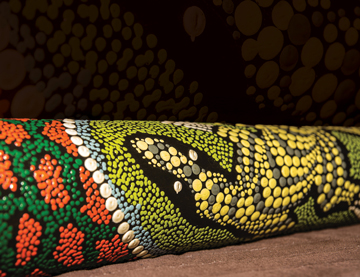Banner Image

Aboriginal and Torres Strait Islander cultures and civilisation are a critical element of the story of Australia. With a history dating back at least 65,000 years, it is a rich and diverse culture.
“The archaeological history of the First Australians is a truly remarkable story,” says biological anthropologist and archaeologist Michael Westaway, Senior Research Fellow at the Australian Research Centre for Human Evolution, Griffith University.
“At a time when Europe was still the domain of Neanderthals, the earliest Aboriginal societies were establishing complex religions, burying their dead with elaborate rituals, engaging in long-distance trade, making jewellery, and producing magnificent works of art.”
“Over the ensuing millennia these societies witnessed huge changes, including the mass extinction of the megafauna and the intense desertification of Australia during the last great Ice Age. They changed and adapted and rose to these significant challenges. They made social and economic choices, developed sustainable ways of living, undertook significant engineering feats and created one of the most unique ‘civilisations’ in the world
Source: https://www.sbs.com.au/news/why-our-kids-should-learn-aboriginal-history
The benefits of learning about our Aboriginal and Torres Strait Islander history and cultures
Learning about indigenous history and culture encourages students to develop respect for diversity, empathy, engagement and an understanding of cultural difference.
“It is important to respect, recognise and invest in Aboriginal and Torres Strait Islander people’s cultures,” according to the Federal Government’s Closing the Gap initiative. “Aboriginal and Torres Strait Islander people have told us repeatedly that it is central to their lives, and identified culture as a key factor in improving and maintaining wellbeing. It shapes Indigenous identity, linking people to their community and country, and importantly is a contributing factor to health and wellbeing.
Source: https://closingthegap.pmc.gov.au/celebrating-indigenous-culture
‘Much of the history that many people carry into their adult lives comes from the history they were taught at school. In Australia we have an incredibly rich and diverse Aboriginal past that has been locked away in the landscape for some 65,000 years. If people begin to learn about that past at an early age and start to think about it as an important part of the Australian national story then I think it will help to demolish many of the misconceptions and biases that are held towards Aboriginal people that we still see today,’ Dr Westaway said.
“Aboriginal and Torres Strait Islander cultures are complex and diverse. The Indigenous cultures of Australia are the oldest living cultural history in the world – they go back at least 65,000 years. Indigenous communities keep their cultural heritage alive by passing their knowledge, arts, ceremonies and performances from one generation to another, speaking and teaching languages, protecting cultural materials, sacred and significant sites, and objects. For indigenous Australians, the land is the core of all spirituality and this relationship and the spirit of ‘Country’ is central to the issues that are important to Indigenous people today.”
Ngunnawal Elder, Tina Brown
Source: https://closingthegap.pmc.gov.au/celebrating-indigenous-culture
Learning more
There are a number of school activities, school excursions and school camps that celebrate and educate Aboriginal culture and heritage. These include:
Nitmiluk Tours
Nitmiluk Gorge, located in Katherine, features some of the most stunning gorge scenery in the Northern Territory - with raging waterfalls, myriad wildlife and breathtaking views of the Jawoyn country.
Nitmiluk Tours offers a variety of tours that allow participants to immerse themselves in the history, rugged beauty and culture of this majestic region.
Nitmiluk Tours and the Jawoyn people offer education programs formatted to Australian Curriculum Standards for students level 3-10. Each program provides students a remarkable and life changing cultural immersion program, requiring them to ask what it is to be an Indigenous Australian.
The programs include a range of activities from canoeing, cruising, nature walks and dreamtime storytelling to fire lighting, spear throwing, basket weaving and painting. All activities are interactive and students are encouraged to participate.
Students are hosted by Aboriginal guides, and are provided with work books that correlate to the Australian curriculum to assist with the learning experience.
Sydney Learning Adventures (SLA) - Ngara
An initiative of Property NSW, Sydney Learning Adventures aims to create quality educational excursions that are enriching, diverse, safe, accessible and sustainable.
The Ngara experience located at The Rocks, Sydney, is suitable for Years 1 - 6 (Stage 2 to Stage 3 History and Aboriginal Languages).
Ngara means listen/hear/think in the language of the Gadigal people, the original people of The Rocks area. Students will learn about the history of Aboriginal people from an Aboriginal perspective. Students discover some of the important milestones in Aboriginal political history and the people, both Aboriginal and non-Aboriginal, who have made these things happen. They will also discover the Aboriginal place names for areas around The Rocks and some of the important historical events that impacted on the lives of Aboriginal people.
Want to learn more about Aboriginal cultural awareness, so you can incorporate it further into your school activities, school excursions and school camps?
An Aboriginal cultural awareness learning tool is available at https://www.education.vic.gov.au/school/teachers/profdev/Pages/indigenousculture.aspx
The online professional learning tool aims to assist staff and schools to develop their knowledge and understanding of Aboriginal cultures.
The resource consists of three modules which provide advice, processes and practical suggestions as to what teachers should know and be able to do in order to teach all students about Aboriginal and Torres Strait Islander languages, history and culture.
The modules reference the Department’s Aboriginal Inclusion Plan, the Australian Curriculum and Assessment Reporting Authority (ACARA)’s cross-curriculum priorities and the Australian Professional Standards for Teachers.
